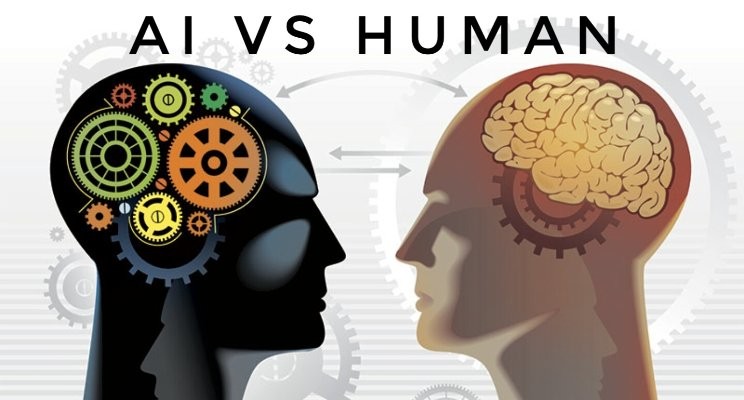News

Human Vs. Artificial Intelligence: Understanding The Key Differences
The article explores the definition of intelligence, the differences between human and artificial intelligence, and the disruption caused by AI's ability to learn and apply knowledge, despite ongoing debates over their exact definitions.
The terms used to describe human intelligence, such as smartness, understanding, brainpower, ability to reason, sharpness, and wisdom, have been the subject of numerous debates over the centuries, with intelligence generally referring to the ability to acquire and apply knowledge and skills through biopsychological means, and the ongoing debates fueled by competition and uncertainty about the appropriateness of the biopsychological aspect of its definition, while the emergence of artificial intelligence (AI) has disrupted human society with machines exhibiting the ability to learn and apply knowledge in ways that were once exclusive to humans, however, human and artificial intelligence are significantly different and not interchangeable, despite the ongoing debate over their exact definitions.
Differentiating artificial intelligence from human intelligence: One-shot versus multishot learning.
One of the remarkable attributes of human intelligence is its capacity to acquire new knowledge and comprehend novel ideas from a small set of examples, sometimes even from a single instance, and to recognize patterns and apply them to generalize and extrapolate. For instance, if a person is shown one or two images of a leopard and then presented with images of various animals, they can accurately identify whether those images depict a leopard, a skill known as one-shot learning.
In contrast to human intelligence, artificial intelligence systems typically require a substantial number of examples to attain a similar level of learning. To surpass the learning capacity of an average human, an AI system may need millions, or even billions, of samples. This need for multishot learning sets apart AI from human intelligence, leading many researchers to argue that humans, on average, are more efficient learners than AI systems.
Creativity and repetition.
Human intelligence is often characterized by psychologists, philosophers, and cognitive researchers as possessing a fundamental ability to imagine, with some even regarding imagination as an essential aspect of human identity. The increasing urgency of global challenges, such as climate change and potential international conflicts, has prompted a growing need for imaginative problem-solving. The notion that human survival in the 21st century hinges on innovative ideas has sparked a renewed interest in exploring human imagination and how best to foster it.
While definitions of imagination vary, it is generally understood to refer to the capacity to create mental images, sensations, and concepts of phenomena that do not exist or are not present. Humans frequently imagine things that could have been, might have been, or could never be, showcasing the breadth of imaginative capabilities that are inherent to human intelligence.
In contrast to human intelligence, many researchers contend that artificial intelligence systems rely on recitation rather than imagination. Recitation refers to the ability to recall information as it was presented, a task that computer systems are adept at performing. Some AI systems can even recite information in synthesized forms. For example, an AI system trained on various types of automobiles can generate mashups of the examples from which it learned, such as a combination of a 1968 Ford Mustang, a 1950 Volkswagen Beetle, and a 2023 Ferrari Portofino. While a subset of AI researchers have described this as a form of imagination, a more accurate description would be to classify it as synthetic recitation.
Input and output involve multiple senses.
Another remarkable aspect of human intelligence is its capacity to receive and rapidly integrate information from all sensory modalities, using this integrated perception to inform decision-making. Sight, hearing, touch, smell, and taste blend seamlessly and swiftly to form a cohesive understanding of our surroundings and internal states. Humans are also capable of responding to these perceptions with complex reactions that draw upon multiple modes of sensation. Thus, the average human can incorporate multisensory inputs and generate multimodal outputs.
As of 2023, the majority of artificial intelligence systems are not capable of learning in a multimodal fashion. Prominent AI systems, such as ChatGPT, can only process inputs in a single format, such as text. However, some autonomous vehicles are equipped to receive inputs from multiple sources. Self-driving cars, for instance, utilize a range of sensor types, including radar, lidar, accelerometers, and microphones, to gather vital information from their surrounding environment. To make navigational decisions, self-driving cars rely on multiple AI systems that can interpret and integrate these diverse streams of information.
Collaboration between artificial intelligence and human intelligence.
As the development and implementation of AI technology continue to advance, and the need for practical and imaginative solutions to pressing global challenges becomes more urgent, it is likely that we will witness an increasing convergence of human and AI intelligence in collaborative efforts.
Recent surveys of the general public, as well as policy-makers across the globe, suggest a strong reluctance to cede decision-making authority to even the most sophisticated AI systems. However, the complexity of the issues currently facing human societies appears to exceed the capacity of humans to identify timely and effective solutions. In this context, the collaboration between human and AI intelligence may represent our best hope for progress.
Michael Bennett, who serves as the director of an educational curriculum and business lead for responsible AI in The Institute for Experiential Artificial Intelligence at Northeastern University in Boston, has previously held the position of director of student experiential immersion learning programs at the University of Illinois' Discovery Partners Institute. He holds a JD from Harvard Law School.
Recommended to read

SULC Louisiana Esports League: A New Era of Competitive Gaming Begins
Southern University Law Center (SULC) has joined forces with Vanta, a full-service esports platform based in Hull, Massachusetts, to introduce the SUL...
Read more
Get K8 Airdrop update!
Join our subscribers list to get latest news and updates about our promos delivered directly to your inbox.


